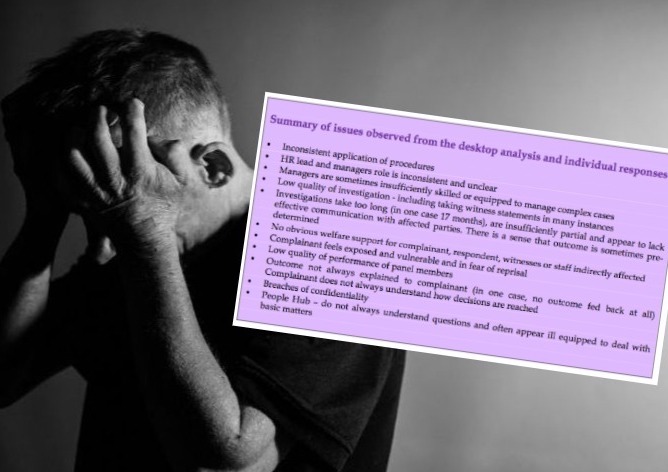


A new report has uncovered a “high level” of secret bullying within the States, where employees have allegedly been “shouted at”, “belittled”, and been made the subject of “loose talk and gossip.”
But many are scared to speak up over fears that doing so would be “career wrecking” – and those that do can face waits of up to a year-and-a-half before anything is done.
The findings came in a previously confidential £22,000 review into cases of alleged bullying and harassment within all areas of the government and how they’re dealt with by officials, released into the public domain for the first time following an Express Freedom of Information (FOI) request.
It was compiled by the HR Lounge Ltd, who were commissioned by the States Employment Board in July last year following concerns from individuals, trade union representatives and States Members.
Over a six-month period, the external consultancy undertook a study of all bullying cases over the last two years, involving surveys, focus groups and one-to-one interviews. It led them to conclude that the States suffered from a “significant” bullying and harassment problem that needed to be urgently rectified because the States should be leading by example.

Pictured: Key issues identified in the report.
“…You have a duty as a public authority to set an example for other organisations to follow. We would suggest that this is particularly pertinent in respect of a tightly knit community such as that exists on Jersey,” the report read.
During the evidence-gathering process, the report noted that several parties did not want to share their experiences, citing worries including “risk of retribution” and “personal exposure”. Indeed, the report found that some complainants had been the subject of “loose talk and gossip.”
Some of those who engaged in the review, however, said the process was the “first time I felt heard.”
Their accounts, coupled with analysis of case files and emails, told of managers without a sense of “good values driven leadership”, who rarely took ‘informal’ action, who did not take policies “sufficiently seriously” and who found resolving bullying complaints “chore-some” and faced them “with a mindset of inconvenience.”
The report also revealed concerns that bullying and harassment investigations were seen as rarely being “independent, impartial or neutral”, instead tending to be “unwieldy, elongated and inconsistent.”
Most cases were not resolved speedily. The majority of cases didn’t see their first hints of resolution until four or five months after the initial complaint was made. In one case, the investigation alone lasted 17 months.

Pictured: Many cases took several months between the initial complaint and 'resolution'.
This was, perhaps, a symptom of the fact that no investigative training had been provided since 2014. The overall training budget had been reduced over the years, and only £500,000 was reserved for “leadership” purposes alone. In this “vacuum”, the report said that departments had formed their own rules and policies on dealing with bullying, leading to ineffectual silos.
Complainants also told of a lack of managerial support when it came to their emotional wellbeing and mental health throughout the complaints process.
They added that there appeared to be a tendency for their bullying concerns to be dealt with via a formal process, rather than through simply listening to employees. The effect of this was staff feeling “awkward and inadequate.” It was suggested that this was because some managers were “scared” to get involved.
Other managers admitted to being overwhelmed by the “weight of complaints”, pushing them into a formal process to “get them off my desk and try and move them forward even though I have no confidence that they will be resolved.” “I am sure that I could resolve matters if I had the time to do so,” one offered.
But some managers had a very different view – they said that bullying allegations were made by some staff simply to cover up their own poor performance. The authors of the report – consultants Martin Tiplady OBE and Evelyn Fearon - were unconvinced by this view, however.
In their summary, they said that there were examples of “good and supportive management”, but the list of negative adjectives provided by staff to describe their seniors – including “controlling”, “empirical”, “overbearing”, “aggressive” and “micro-managing” – far outweighed this sentiment.

Pictured: Adjectives States staff used to describe their seniors.
While employees are told that they can contact HR with any concerns, the newly-created People Hub was described as being incapable and inadequately prepared to deal with such complaints.
Trade union representatives, meanwhile, expressed concerns that HR staff were “judge and jury” when it came to dealing with bullying complaints, and that they would naturally take the side of senior management, with the junior member of staff often being forced to move instead.
The report also underlined that few staff knew about – let alone understood – the States’ whistleblowing policy, which allows them to disclose potential criminal offences, breaches of duty and miscarriages of justice involving their colleagues without fear of retribution.
HR Lounge's report wasn't the first time the States' alleged failure to adequately tackle bullying had been raised publicly. The Chapman Report made recommendations to update the policy on bullying back in 2010 after a former Minister was accused of bullying States staff, while more recently Deputy Russell Labey asked questions of the former Education Minister regarding bullying and harassment procedures at Highlands College.
Recent changes in leadership at the top levels of government were regarded positively in this most recent report, however, as they were seen as providing “a real opportunity to alter the current response to bullying and whistleblowing complaints.”

Pictured: Deputy Russell Labey had previously hinted at issues within the Education Department during States Assembly questioning.
Moving forward, they suggested a refreshed States policy on the matter, which makes it clear that there is “nil tolerance of issues of bullying and harassment”, as well as a three-year period of managerial training to ensure that senior staff “are briefed on dealing with such incidents.” They added that managerial intervention and mediation could also be more heavily relied upon as conflict resolution tools.
Improvements to the investigation process were also suggested, including “creating a pool of properly trained investigators” within the States workforce. We propose that a small cartel of investigative resources be established by way of a small team made up of ‘seconded ‘Jersey staff working on secondment for a period of say, two years as well as a relationship with externally sourced investigators for particularly difficult, senior or sensitive cases,” the report explained.
‘Friends’ to act as confidantes who provide procedural updates for complainants, respondents and witnesses were also suggested as a way of providing better support to those involved in bullying cases.
Should the States choose to implement those “inexpensive or nil-cost” recommendations, the report concluded that the organisation will “better project and represent [its] status as an employer of choice and be able to maintain a stronger and more contemporary organisational culture.”
Comments
Comments on this story express the views of the commentator only, not Bailiwick Publishing. We are unable to guarantee the accuracy of any of those comments.